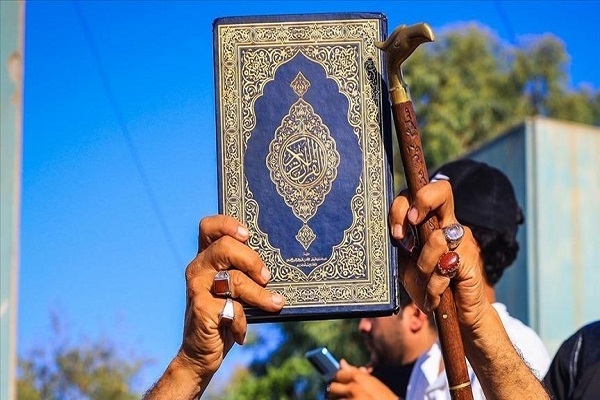Arrest Made in UK After Quran Desecration


He has allegedly burned pages from a copy of Islam’s Holy Book.
It comes a few days after the murder of Salwan Momika, who had garnered international attention for similar acts.
The Quran burning in Manchester took place near the Glade of Light Memorial on February 1, 2025, at approximately 2:45 PM, when police apprehended the 47-year-old man on suspicion of committing a racially aggravated public order offence.
The arrest took place after video footage of the burning was live-streamed on social media, igniting concerns within the community.
Assistant Chief Constable Stephanie Parker of Greater Manchester Police expressed awareness of the incident and the sensitive nature of the act. “We understand the deep concern this will cause within some of our diverse communities and are aware of a live video circulating,” she told GB News.
Parker emphasized the importance of addressing potential intimidation arising from such acts, stating, “We made a swift arrest at the time and recognize the right people have for freedom of expression, but when this crosses to intimidation to cause harm or distress we will always look to take action when it is reported to us.”
This unsettling incident coincides with the recent shooting death of Salwan Momika, known for public demonstrations where he burned the Quran. Momika was shot dead near Stockholm, Sweden just two days before the Manchester event, stirring international outrage and concern over the provocative nature of his actions. Swedish authorities reported the 38-year-old was gunned down as he live-streamed on TikTok, bringing the issue of Quran desecration and its consequences to the forefront of discussions surrounding freedom of speech and religious sensitivity.
Momika had faced legal challenges surrounding his protests, which were viewed as inflammatory by many, particularly within the Muslim community. Before his death, he had scheduled court appearances related to accusations of inciting ethnic hatred through his demonstrations. His actions had previously provoked significant backlash, leading to condemnation from multiple countries. The act of burning the Quran is widely perceived by Muslims as blasphemous.
The incident at the Glade of Light, which memorializes the victims of the 2017 Manchester Arena bombing, adds another layer of complexity to the already charged atmosphere. Witnesses report seeing the man burn pages of the Quran as he live-streamed the act, prompting immediate concern among onlookers and justice officials alike.
“The rapid response from the police shows our commitment to maintaining public safety and addressing offences driven by hate,” Parker continued, reflecting the force's strategy to manage community relations sensitively. The incident drew calls for tolerance and mutual respect amid rising tensions surrounding religious practices and beliefs.
Greater Manchester Police has urged anyone with additional information to come forward, reinforcing their commitment to safeguarding the community against acts of hate and intimidation. The request highlights the police's proactive approach to engaging the public and addressing potential unrest stemming from such polarizing events.
Momika’s recent activities had already raised alarms over the potential for violence and incitement within communities sensitive to religious narratives and expressions. His brazen acts of public demonstration were often met with fierce backlash not only from local communities but also from international observers concerned about the impact on social cohesion.
Read More:
The stark reality of freedom of expression versus the respect for religious sentiments remains hotly debated. The arrest of the man involved in the Manchester Quran burning reflects the delicate line policymakers and law enforcement must navigate to maintain order and respect between diverse cultural and religious groups.
With multiple arrests already made concerning the investigation of Momika’s murder, authorities are grappling with the broader ramifications of such incidents on community safety and coexistence. The recent escalation of inflammatory acts against religious symbols has sparked discussions on the need for tighter regulations governing public demonstrations related to religious content.
Assistant Chief Constable Parker noted the importance of dialogue and education as means to address these issues. “We have to engage with our communities proactively to prevent misunderstanding and mitigate harm,” she remarked, emphasizing the need for outreach programs to facilitate communication among different cultural groups.
Violent acts of extremism and reactions to them pose serious challenges. The community must navigate through layers of anger, misunderstanding, and the right to protest. The incidents related to Quran burning not only serve as flashpoints for conflict but also shine light on the urgent need for constructive engagement on issues surrounding faith and respect.
At the heart of this incident lies the need for dialogue and respect between communities. The community's response to the Manchester Quran burning and the surrounding sentiments offers insight on the path forward, establishing priorities aimed at fostering unity rather than division. Clarity, empathy, and communication might chart the way toward healing from past grievances and building bridges among communities grappling with deep-rooted issues.
Source: evrimagaci.org



